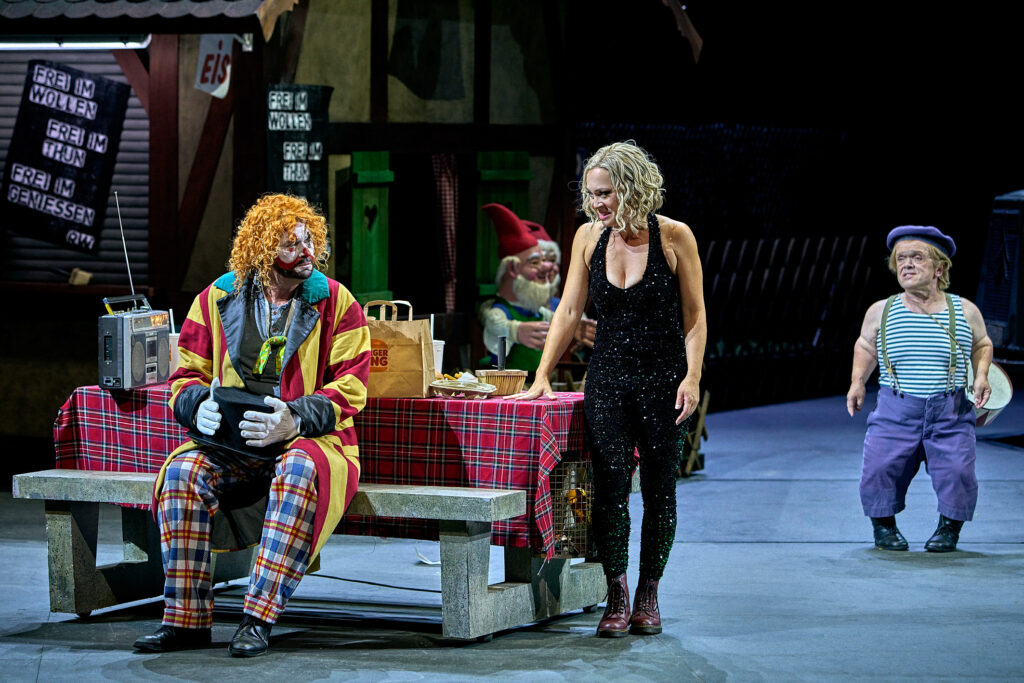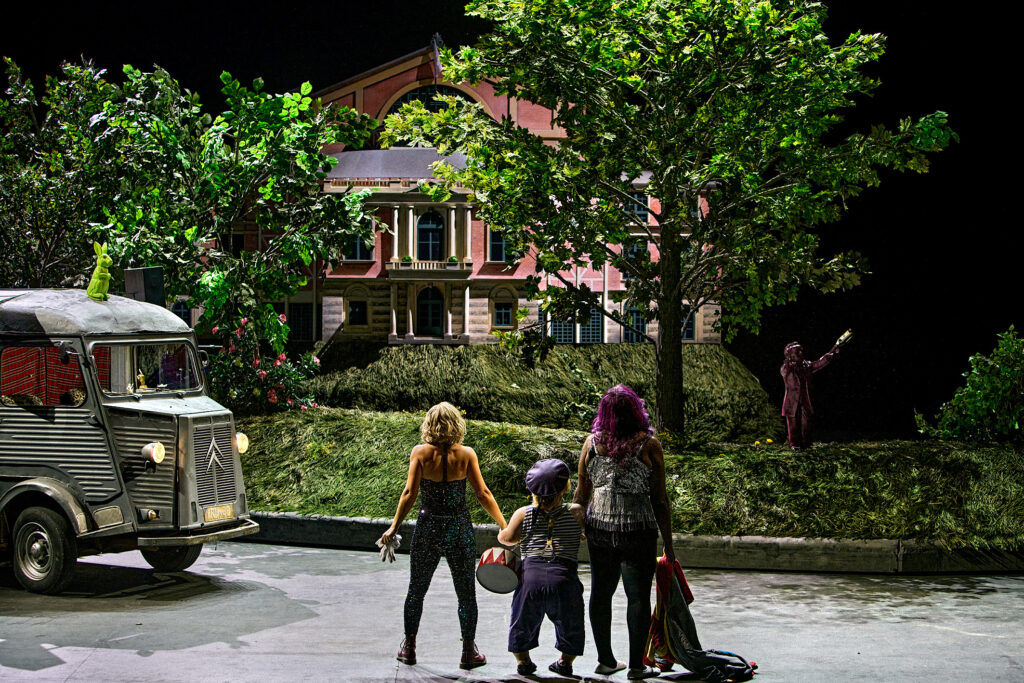Anarchists in the Festspielhaus: Tobias Kratzer‘s production of ‘Tannhäuser’ at the Bayreuth Festival has written theatre history and is as fresh as ever. Revival planned for 2026.
Another summer of revolution in Bayreuth. Tobias Kratzer’s stirring interpretation of ‘Tannhäuser’, which realises Wagner’s youthful revolutionary impetus so convincingly, has retained its freshness even in its renewal year. This confirms the validity of the concept, but also testifies to the team spirit that this director can ignite even with a changing cast. A revival is apparently planned for 2026.

The quartet of anarchic art consisting of Catsuit Venus, Tin Drum Oscar, Drag Queen and Tannhäuser Clown is still travelling in the van, dropping flyers at the Festspielpark pond with the Wagner quote ‘Free to want, free to do, free to enjoy’. New details are constantly being added. It’s touching that they put up a black and white photo of their friend Stephen Gould, who shaped the Tannhäuser role in the early years and died last year. It is piquant that a poster for ‘Claudia’s Punch and Judy Theatre: Hansel and Gretel’ is now hanging at the Hexenhaus rest area; the play in its operatic version by Humperdinck was suggested by the Minister of State for Culture of that very first name as an enrichment of the festival repertoire.

Kratzer’s production traces the various paths of this anarchic quartet very precisely. Tannhäuser is the first to get out of the car after Venus has hit the guard at the wheel while bouncing at the burger drive-in. Tannhäuser’s guilt is no longer erotically motivated, as in Wagner, but all the more understandable, so that he wants to separate from Venus.
He ends up right in front of the replica of the festival theatre, which is surrounded by pious festival pilgrims. The landgrave and minstrels in traditional costume find him here during a smoking break and welcome him back into their crew of festival singers. During the war of the singers, however, the old aesthetic fronts break open again, with Tannhäuser’s love-lust rock against the sublimated ways of the others.

Rainer Sellmaier‘s recreation of a traditional Wartburg Hall scene is countered in an exciting way by Manuel Braun‘s video of the anarchist mates entering the Festspielhaus. They too then end up on the real stage, where the singer’s quarrel is escalating. In the end, the police, telephoned in by the festival director, arrest Tannhäuser ‘in Rome’, while the three bizarre
anarchists get away.

They also go their separate ways. In the third act, Le Gateau Chocolat has become a poster model for expensive watches. The drag queen of the same name gives the role a quirky sex appeal and impresses at the festival pond with her bass-heavy ‘Ol’ Man River’ and offensive audience animation. Only Venus, like Eroticism, remains an activist for new world conditions and continues to stick up flyers. Irene Roberts takes on the role with supple physicality, although her voice has too much vibrato.
Oskar now lives alone in a broken-down van and feeds the wandering Elisabeth with tinned soup from The Tin Drum, a stranded man of human integrity who practises solidarity with the weak. Manni Laudenbach plays him with beautiful authenticity.
Elisabeth had received her childhood sweetheart Tannhäuser at the Festspielhaus with a slap in the face, defended him with lust and verve in the Singers’ War and is now excluded from the hypocritical circle of high culture. When she no longer has any hope of Tannhäuser’s return, she gives herself to Wolfram after all – but only as long as he wears Tannhäuser’s clown costume. His song to the evening star Venus sounds correspondingly bitter, although Markus Eiche sings it with a balsamically beautiful baritone, movingly. Elisabeth Teige plays the world-weary Elisabeth with great intensity. Vocally, her manicured, tremulous soprano seems to come from another era. The audience celebrates her.
At the end, Tannhäuser returns to this wasteland and lays Elisabeth on his lap like a Pietà. Klaus Florian Vogt has grown even more into this role, his tireless tenor sounds powerful and fresh, still beautiful in the singer’s war rage and colourful in the Romer narration. Thanks to his bright timbre, there is even something dreamy about his character of the sad clown who wanted to change the world for the better. In the video, we see him at the end with Elisabeth in a van on the road: private escapism instead of anarchy as the missed path? The four revolutionary biographies in Kratzer’s production reflect Wagner’s path.
In addition to the differentiated singing of the Festival Chorus, Nathalie Stutzmann on the podium of the Festival Orchestra is the pillar of the evening, developing the work very organically so that even slower passages do not slow down but invite the audience to empathise. Everyone is rightly applauded.
The fact that the directing team of this production, which is very popular with the audience, receives a few notorious boos shows that the production can still be disturbing. It has long since written theatre history beyond Bayreuth. It is a good decision by the festival management to include it in the programme again in the anniversary year 2026. The flag of revolution must also fly for 150 years of the Bayreuth Festival!